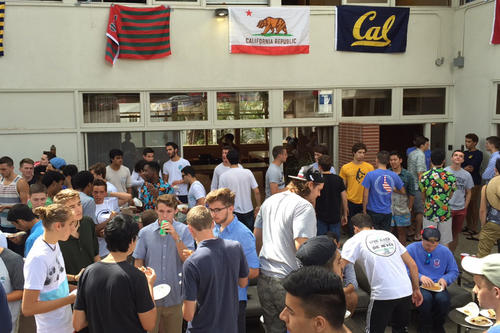To frat or not to frat
Letter from... California! Louis Potthoff observes the busy social life in student fraternities.
Oct 30, 2015
Open to new impressions: Louis Potthoff, shown here in front of Sather Gate, the main entrance to the University of California in Berkeley, is getting to know American college life better and better. He took a look at various fraternities.
Image Credit: Private
Recruiting members: The various fraternities look for new “brothers” during the first few weeks of college.
Image Credit: Private
One of Berkeley’s more than 30 libraries. Laptops and e-readers are not allowed at this one, which is why Louis Potthoff appreciates it for a quiet break between lectures.
Image Credit: Private
The first two months of college have passed, and the initial familiarization phase is over. To my astonishment, I realize: It is possible! Sure, everything is very labor-intensive – homework, essays, pop quizzes. But because everyone is in the same boat, it doesn’t feel all that terrible. When everyone is studying, you study, too. And the social life is slowly picking up, too. Since the minimum age to drink alcohol or go to a bar or club in the U.S. is 21 and Berkeley is also on the small side, most parties take place at fraternity houses.
Fraternities, or “frats” for short, are the American form of student association – although here in the United States, the focus is more on party excess than on political affiliations. The members of these frats, called “brothers,” live in a house of their own that is financed by dues and fees of as much as 3,000 dollars per member per semester.
Frats are a hot-button issue in the U.S., since they are regularly involved in scandals and excesses that are reported in the media nationwide. Still, new applicants flock to these organizations every semester. That is due to two main factors: first, the regular parties, but second, also the idea of automatically becoming a part of a firm group, and thus of a network whose members will ideally support each other throughout their lives.
Party-hopping
One of my neighbors in the dorm is interested in the frats. His father and grandfather belonged to frats, and now he wants to, too. He asks me to go along with him during the application process. The various fraternities host a party almost every night for an entire week – sounds great, but it soon gets to be stressful. True commitment is demanded now: Being present without exception is a requirement for successful applicants, which is why we race from one party to the next, night after night.
At the parties themselves, another applicant explains, it is hugely important to talk to as many “brothers” as possible and make a good impression. He is very involved, shaking a lot of hands, laughing at bad jokes, and never tiring of asking people whether they are members of this frat. One of the brothers tells me he joined back when he first started out because the school was too big for him and he simply wanted to be a firm part of a smaller group. I ask whether it’s worth the price, but by then he’s already moved on to the next “interview.”
I don’t much care for all this. But at the end of the week, my housemate is approved. The official joining process will take all semester and consists mainly of allowing himself to be bullied by older brothers. In the second semester, when he is a full member, he will be allowed to terrorize the new applicants himself. And invite guests over – like me, for example!



